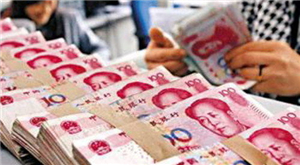China fiscal revenue rises 6.1 pct in Aug
Xinhua, September 15, 2014 Adjust font size:
China's fiscal revenue rose 6.1 percent year on year to 910.9 billion yuan (149.33 billion U.S. dollars) in August, slowing from the 6.9-percent rise seen in July, the Ministry of Finance said on Saturday.
Central government revenue reached 445.4 billion yuan, up 5.5 percent year on year, while local government revenue stood at 465.5 billion yuan, up 6.6 percent from the same period last year.
The pace of fiscal spending also slowed. In August, national fiscal expenditures went up 6.2 percent to 1.02 trillion yuan, retreating from the 9.6-percent surge in July.
The monthly growth rate of China's fiscal revenue is relatively low, a result of more tax cuts under a program to replace business tax with value-added tax (VAT) and the slow growth of taxes on imports and exports, said a statement on the ministry's website.
In the first eight months, fiscal revenue went up 8.3 percent to 9.64 trillion yuan, according to the ministry.
In the January-August period, fiscal revenue collected by the central government fell short of the budgeted full-year growth rate of 7 percent, expanding 6 percent year on year to 4.51 trillion yuan, while revenue for local government increased 10.4 percent to 5.13 trillion yuan.
In the January-August period, spending by the central government went up 11.4 percent to 1.4 trillion yuan, and spending by local governments rose 14.4 percent to 7.56 trillion yuan.
"In the coming months, it will be relatively difficult for central fiscal revenue to grow," the ministry said in the statement, citing more tax cuts under the program to replace business tax with VAT and a higher comparison base last year.
The weak fiscal revenue growth could create pressure for China's policymakers to stabilize the economy, which grew 7.4 percent year on year in the first half, the highest of all major economies but below the full-year target of 7.5 percent.
China has vowed to revamp its fiscal and tax system as part of efforts to jump-start a new round of across-the-board reforms in the country.
Its present fiscal system, which leaves too many spending obligations to regional governments without giving them an adequate share of fiscal revenues, is partly to blame for the current local government debt problem, according to some analysts.
Chinese governments at various levels owed a total of 20.69 trillion yuan, according to a state audit of public finances last year.
One of the highlights of the reform is the program to replace business tax with VAT in some service sectors, which analysts said may reduce tax revenue to some degree in the short term.
China aims to fulfill key tasks in the new round of fiscal and tax reforms by 2016, and establish a "modern fiscal system" by 2020.


